In a growing sea of skin care launches, it can be hard to tell what ingredients are truly trusted by experts versus just a trend. Vitamin C, a powerful antioxidant, is a longstanding favorite of health professionals thanks to a vast body of research that supports its benefits. When consumed in food or drink form, it can protect your entire body’s cells from damage that can lead to conditions including cancer; when applied topically, the best vitamin C serums deliver that protection directly to your skin cells. In fact, research shows topical vitamin C can help prevent signs of aging, hyperpigmentation, and cancer-causing UV damage.
But not all vitamin C skin care products are created equally. You’ll often see vitamin C in skin care products in acid form — at certain concentrations though, it can be irritating, especially for those with sensitive skin. Vitamin C is also a highly unstable ingredient, according to experts — the same chemical properties that allow it to work as an active antioxidant in your body also make it susceptible to oxidation that will make it inactive in your skin.
To help you find the best vitamin C serum for your skin type and learn more about who best benefits from it, we spoke with three board-certified dermatologists for their shopping guidance recommendations.
SKIP AHEAD The best vitamin C products in 2023 | Benefits of vitamin C for skin | How to shop for vitamin C skin care products
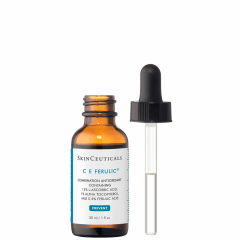
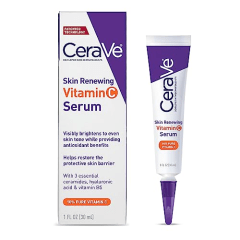
Best budget-friendly pick
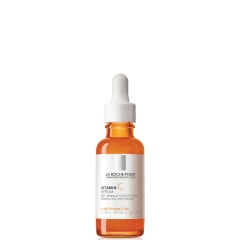
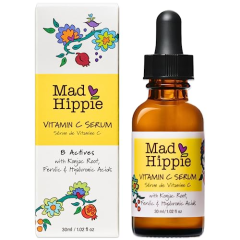
How we picked the best vitamin C serums
You can find Vitamin C in various skin care products, but the experts we spoke to recommend working it into your routine via serums. “Serums are lightweight and easier to layer with moisturizers, sunscreens, and cosmetic products,” says Dr. Erum Ilyas, M.D., FAAD, a board-certified dermatologist with the Schweiger Dermatology group in Pennsylvania. For a vitamin C serum to be effective, dermatologists say there are a few key things to consider:
Packaging: Packaging that prevents the product from coming into contact with the air helps to ensure that your serum stays active. Ideally, vitamin C serums should come in a pump bottle rather than in a dropper, which exposes the serum to air every time you open it, our experts told us. Type of vitamin C: The type of vitamin C will also determine how effective it is, according to our experts. Pure vitamin C, known as L ascorbic acid, is the most effective form of the antioxidant when formulated correctly. But this is also the most irritating form, making it less than ideal for those with sensitive skin. Other forms of vitamin C are slightly less effective but gentler, including sodium ascorbyl palmitate (a fat-soluble molecule often found in creamier skin care products), and tetrahexyldecyl ascorbate (an oil-based form of vitamin C that penetrates skin deeply and is less irritating). To effectively penetrate skin, vitamin C products must be formulated at a low pH level (between 2.5 and 3.5), which some brands will list on the packaging. (Products with a low pH level are slightly acidic, which is one of the reasons vitamin C can be irritating. If you have sensitive skin, introduce a low pH product slowly.) Concentration: Most vitamin C serums on the market are formulated with a concentration between 10% and 20%. “Beyond that, it’s just irritating and not necessarily more effective,” says Dr. Carmen Castilla, M.D., a board-certified dermatologist at the New York Dermatology Group in Manhattan.
The best vitamin C serums of 2023
To get the antioxidant benefits of vitamin C in your skin care routine, our experts recommend looking for a serum with a concentration between 10% and 20%. Below, they share their favorite formulas for all skin types.
Skinceuticals CE Ferulic

All three experts we spoke to recommended Skinceuticals CE Ferulic, a serum containing 15%L-ascorbic acid. It’s often referred to as the gold standard in vitamin C serums by dermatologists. “It probably has the most evidence behind it,” says Castilla, referring to the clinical studies conducted by the brand that show a 41% reduction in oxidative damage in the skin.
It’s also one of the more stable formulas on the market, thanks to the inclusion of vitamin E and ferulic acid, according to Dr. Sejal Shah, M.D., board-certified dermatologist and founder of Smarter Skin Dermatology in New York. “This combination makes Vitamin C more potent,” says Ilyas, and helps prevent the L-ascorbic acid from oxidizing before it can reach your skin. The one caveat our experts call out is the packaging: the dropper bottle means this serum is exposed to more air. According to the brand, however, the formula should remain stable and effective for up to six months after it’s opened.
CeraVe Skin Renewing Vitamin C Serum

As a less pricey alternative, all three of our experts also recommend this drugstore serum. In addition to 10% L-ascorbic acid, CeraVe’s serum also has ceramides, which strengthen and support the skin barrier, and hyaluronic acid, a humectant that helps skin attract and retain moisture. Castilla particularly likes its packaging: “It’s in a squirty bottle, which is a little bit better at preventing oxidation,” she says.
La Roche Posay 10% Pure Vitamin C Serum

Another dermatologist-recommended drugstore vitamin C serum, this 10% L-ascorbic acid formula also has salicylic acid. This can be a pro or a con, depending on your skin type, according to our experts. If your skin can tolerate it, the exfoliative benefits of salicylic acid can work together with vitamin C to fade dark spots faster, says Ilyas. If your skin is sensitive, however, the combination may be too irritating, according to Shah.
Kiehl’s Clearly Corrective Dark Spot Corrector
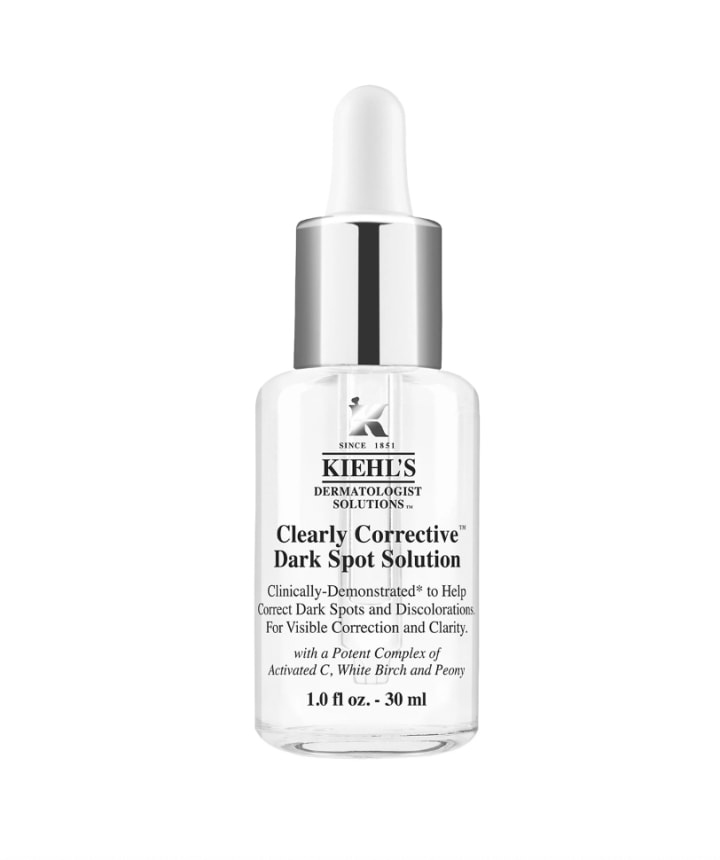
Shah also likes the vitamin C and salicylic acid combo found in this Kiehl’s formula, which specifically aims to target dark spots, acne scars and hyperpigmentation. It has a stabilized form of vitamin C called 3-O-ethyl ascorbic acid, which is more easily absorbed by the skin, according to research published by the National Institutes of Health. You can use it both morning and night after cleansing.
U Beauty Resurfacing Compound
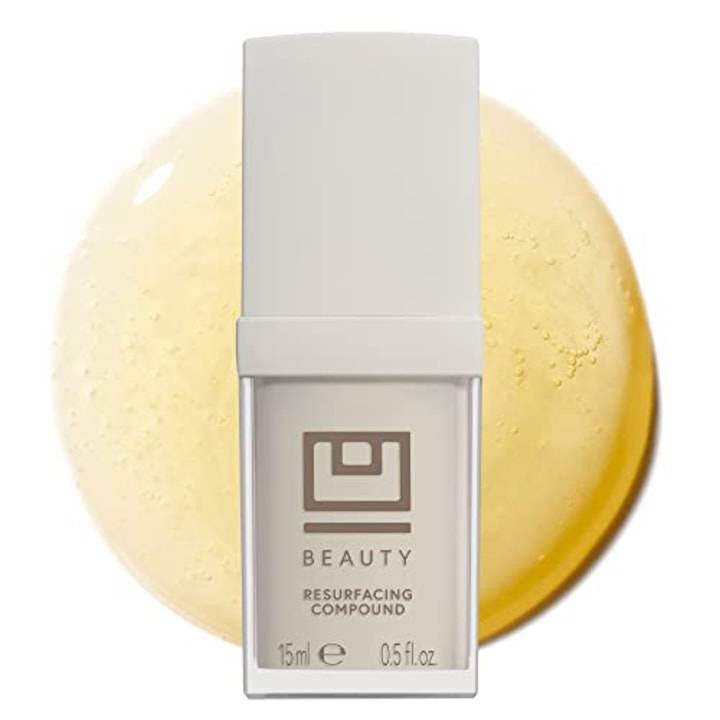
U Beauty’s resurfacing compound is a serum that combines retinol, glycolic acid, and hyaluronic acid with vitamin C to target hyperpigmentation, fine lines, and uneven skin texture, according to the brand. It uses a gentler, more stable form of vitamin C called sodium ascorbyl phosphate or SAP. “Its penetration [into the skin] isn’t as good as L-ascorbic acid, but SAP has been shown to help with collagen production and it can also be a little bit better for oily acne prone skin types,” says Castilla. Apply the resurfacing compound on dry skin right after cleansing and massage into skin before layering on other products.
Mad Hippie Vitamin C Serum

Mad Hippie’s vitamin C serum also uses sodium ascorbyl phosphate, but comes at a much lower price point. “This one is really good for addressing hyperpigmentation,” says Castilla. Like the top-rated (and much more expensive) Skinceuticals CE Ferulic serum, Mad Hippie’s version also pairs brightening vitamin C with stabilizing vitamin E and ferulic acid; when combined, research shows this trio of antioxidants can double a serum’s ability to protect skin against sun damage. To top things off, it also hydrating thanks to ingredients like hyaluronic acid and aloe, according to the brand.
Dr. Loretta Anti-Aging Repair Serum
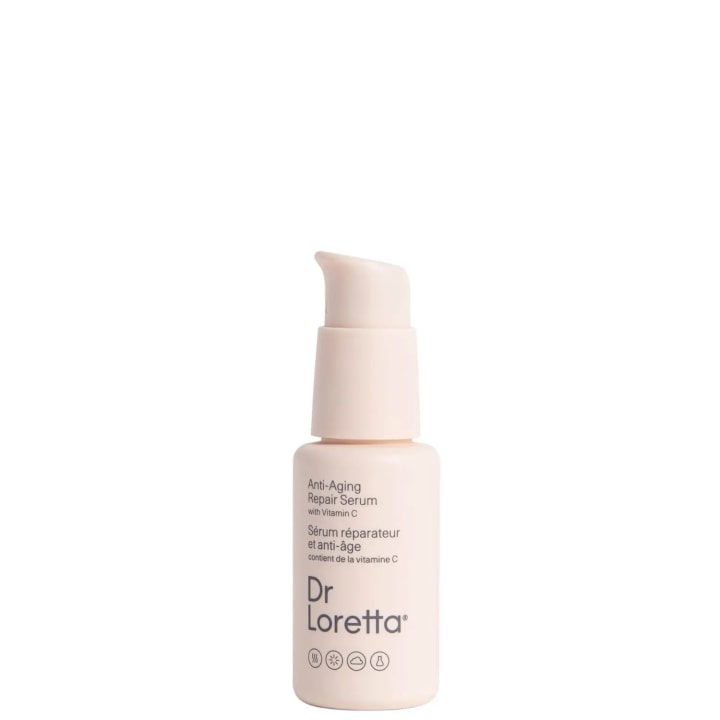
This formula has tetrahexyldecyl ascorbate, a powerful but less irritating form of vitamin C, which penetrates more deeply into skin than L-ascorbic acid. “It also has glycolipids, which are helpful for collagen production,” says Castilla. (Collagen is the most plentiful protein in your body and is responsible for giving strength, structure and elasticity to your skin, according to the Cleveland Clinic.) As a bonus, this serum comes in an opaque, pump bottle to help reduce oxidation and maintain the formula’s effectiveness.
Revision Skincare Vitamin C Lotion
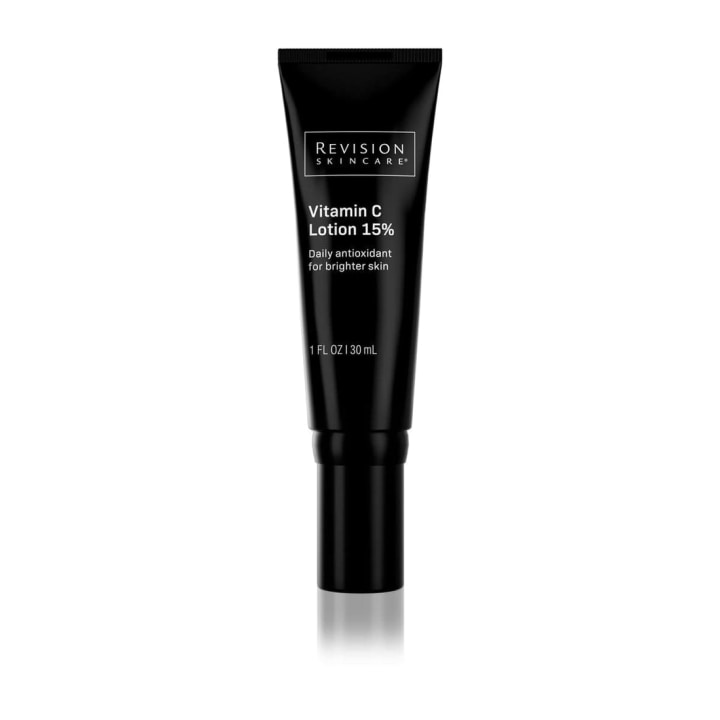
Shah recommends this serum-moisturizer hybrid, formulated with 15 percent tetrahexyldecyl ascorbate. This stable lotion comes in a squeeze bottle and is formulated with squalane, an oil with anti-inflammatory benefits, making it particularly good for those with sensitive or acne-prone skin. It comes in two concentrations: 15% and 30%. If vitamin C is a new addition to your skin care routine or your skin gets irritated easily, start with a lower concentration and make sure your skin can tolerate it before trying a formula with 30% vitamin C.
Paula’s Choice C15 Super Booster
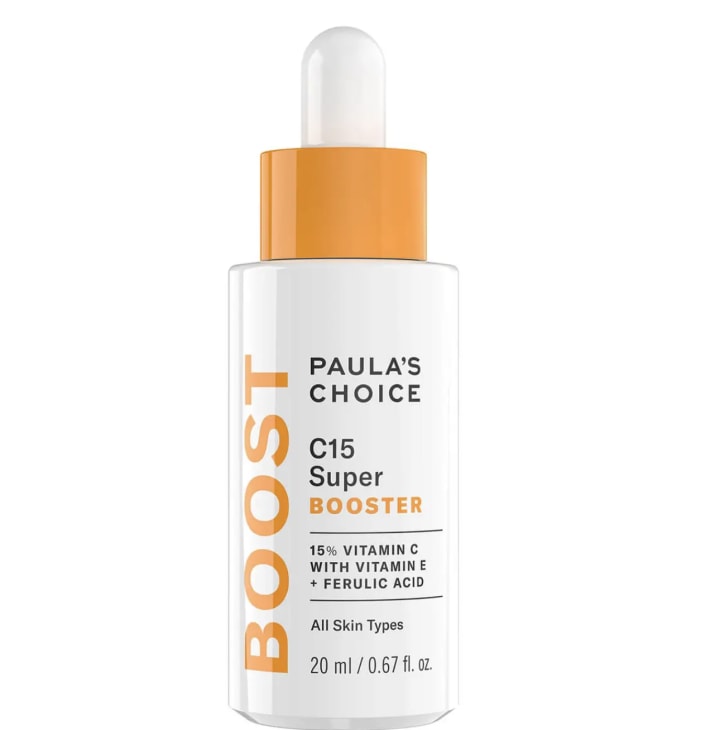
You can use this 15% L-ascorbic acid formula, which comes recommended by Castilla, on its own as serum, or as a brightening booster by adding a few drops to your favorite moisturizer, according to the brand. Like many of the other serums recommended by our experts, it’s formulated with stabilizing antioxidants ferulic acid and vitamin C.
107 Beauty Soseo Vinbiome Vitamin C Serum
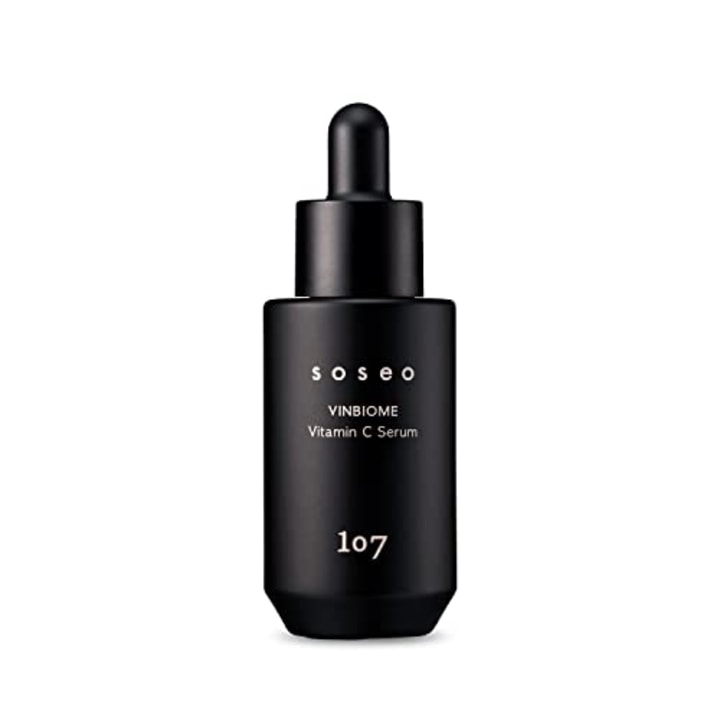
This multitasking serum, which comes recommended by Shah, targets pigmentation, redness, and skin elasticity. Formulated with 15% ethel ascorbic acid, a stabilized form of vitamin C, it also includes probiotics, which studies show support skin health by protecting the skin microbiome and boosting skin’s immune response.
The Inkey List 15% Vitamin C + EGF Serum
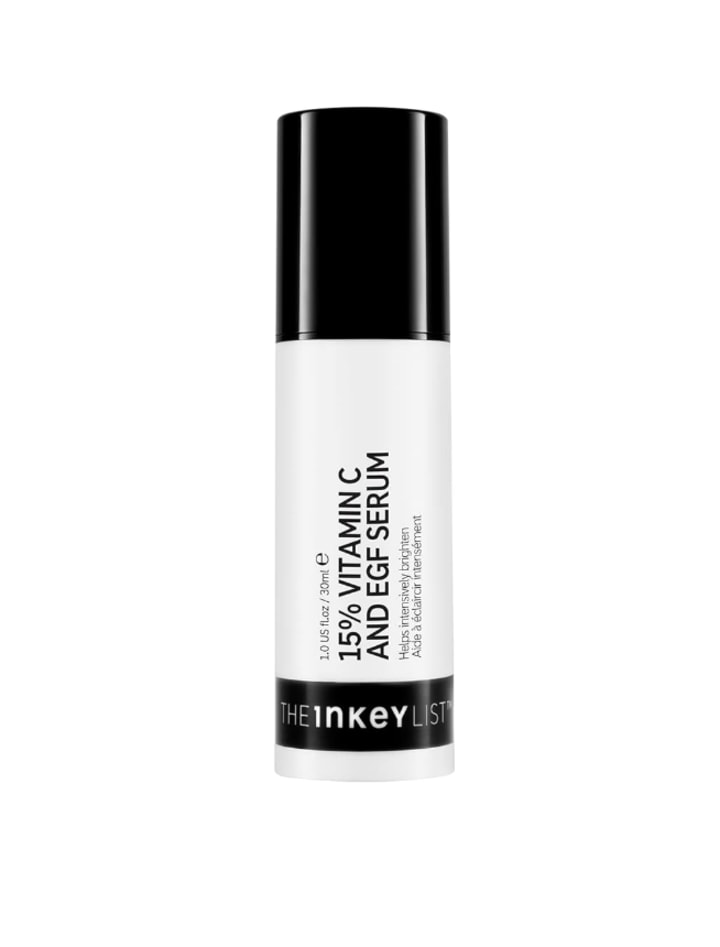
You should use this stabilized vitamin C serum (which is converted to its active, i.e. strongest, free-radical neutralizing form once applied, says Shah) after cleansing and before moisturizer and SPF, according to the brand. In addition to the 15% ascorbyl glucoside (vitamin C), Shah likes that it has a plant-derived peptide designed to support skin elasticity.
What are the benefits of vitamin C for your skin?
When used as a consistent part of your skin care routine, vitamin C can have many benefits. Below, we summarized the most convincing benefits, according to our experts:
Vitamin C helps protect your skin from sun and other harmful substances. “The most convincing evidence we have for vitamin C [in skin care] is the prevention of free radical damage,” says Castilla. In scientific terms, free radicals are molecules with an unpaired electron, making them unstable and capable of damaging cells. Antioxidants like vitamin C neutralize those radicals by donating an electron, according to Castilla. Sunlight is a common source of free radical exposure as is the pollution your skin is exposed to every day, says Shah. That exposure can “accelerate skin damage and aging through what we call oxidative stress,” she says. Vitamin C protects skin, preventing the breakdown of collagen and elastin. It’s effective at reducing hyperpigmentation. Vitamin C can also protect your skin from unwanted dark spots. “It inhibits an enzyme called tyrosinase in the skin to reduce hyperpigmentation,” says Ilyas. It works best as a treatment for dark spots caused by sun damage and conditions like melasma, she adds. “Not all pigment is the same and I do not always find that acne scars respond consistently as well to vitamin C,” she says. Vitamin C can help reduce redness. Inflammation is often the culprit behind skin redness and dryness. Vitamin C can help treat these issues by inhibiting a pro-inflammatory signaling molecule, says Castilla. It can boost your skin’s collagen production. Your skin needs vitamin C to produce collagen, the primary building block for skin and other connective tissues, that’s responsible for skin elasticity and firmness. “Collagen hydroxylase, an enzyme in the skin that is responsible for collagen formation, is dependent on Vitamin C to function,” says Ilyas.
How to shop for vitamin C serum
Not all vitamin C serums are created equal, according to the experts we spoke to. To get the most out of your products, they recommend understanding the type and concentration of vitamin C in any formula, being mindful of how packaging can impact a serum’s effectiveness, and looking for companion ingredients that support the skin barrier.
Type of vitamin C
You’ll commonly find vitamin C incorporated into a topical product in two ways: in its active form as L-ascorbic acid, or in an inactive form that needs to convert into L-ascorbic acid on the skin, says Shah.
In controlled settings, L-ascorbic acid is the most effective, says Castilla, but in reality the effectiveness of a vitamin C serum may depend on a variety of factors, including your skin type. “L-ascorbic acid can be very unstable so whatever bottle that you get, you have to use it very quickly or it will oxidize,” she says. “Secondly, it has to be formulated at a low pH, meaning it’s very acidic and it can be very irritating for a lot of skin types, especially rosacea-prone skin types.”
Other types of vitamin C — such as 3-O-ethyl ascorbic acid, sodium ascorbyl phosphate, and tetrahexyldecyl ascorbate — are more stable. Shah particularly likes tetrahexyldecyl ascorbate since it converts to L-ascorbic acid really well and also penetrates the skin really well, she says.
Concentration
The dermatologists we spoke to recommend looking for products with a concentration of vitamin C between 10% and 20%. “Beyond 20%, it’s just irritating and not necessarily more effective,” says Castilla.
Packaging
Exposure to light and air are disastrous for the unstable molecules found in vitamin C serums, according to our experts. “What vitamin C does for free radicals is contribute electrons to the free radicals [to stabilize them],” says Castilla. “Once that happens, then the vitamin C is no longer active.”When vitamin C molecules are exposed to oxygen, “it loses those electrons and it becomes an inactive form of vitamin C,” she explains.
Packaging and the way you store your serum are key to its effectiveness. Ilyas recommends serums in opaque or amber colored glass bottles, which block light exposure. And while many top vitamin C serums come in a glass bottle with a dropper, Castilla says those with airless pump bottles will stay active longer. Store your serum away from the sun and don’t hoard it — this unstable ingredient is best used quickly.
Companion ingredients
“Many worthy topical vitamin C-containing serums will often be combined with ferulic acid and vitamin E because this combination can increase the effectiveness of vitamin C,” says Ilyas.
Castilla also recommends pairing your vitamin C with sunscreen. “Sunscreens help block free radical damage, but not all of it,” she says. “Pairing sunscreen with a vitamin C doesn’t improve the UVA/UVB protection, but [the vitamin C] protects against the free radicals that are being produced.”
Frequently asked questions
“Vitamin C is a safe and reasonable product for most skin types,” says Ilyas, but how and when you add it to your skin care routine depends on your skin type and the type of vitamin C you choose. Ilyas usually recommends using vitamin C starting in your 30s because that’s when pigmentation changes associated with light exposure tend to reveal themselves, she says.
If you have sensitive skin, Castilla recommends looking for a formula made with a vitamin C derivative like sodium ascorbyl phosphate or tetrahexyldecyl ascorbate to avoid irritation.
You can use a vitamin C serum either your morning or evening routine, though most formulations are meant for morning use, says Castilla. When applied in the a.m., vitamin C can help fight free radical damage from UV light and the other oxidative stressors your skin is exposed to during the day. If you want to use vitamin C serum twice a day, she recommends sticking with a formula with a lower concentration (10% to 15%) to avoid irritation.
Meet our experts
At Select, we work with experts who have specialized knowledge and authority based on relevant training and/or experience. We also take steps to ensure all expert advice and recommendations are made independently and without undisclosed financial conflicts of interest.
Dr. Carmen Castilla, M.D., is a board-certified dermatologist at the New York Dermatology Group in Manhattan specializing in both medical and cosmetic dermatology. Dr. Sejal Shah, M.D., FAAD, is a board-certified dermatologist and founder of Smarter Skin Dermatology in New York. She specializes in cosmetic dermatology and treating skin of color. Dr. Erum Ilyas, M.D., FAAD, is a board-certified dermatologist with the Schweiger Dermatology group in Pennsylvania. Her expertise includes pediatric and medical dermatology and skin cancer treatment.
Why trust Select?
Macaela MacKenzie is a journalist and former Glamour editor who has covered beauty and wellness treatments for over a decade. For this article, MacKenzie spoke to three dermatologists about the best ways to prevent and treat melasma and highlighted their top skin care picks and the rationale behind them.
Catch up on Select’s in-depth coverage of personal finance, tech and tools, wellness and more, and follow us on Facebook, Instagram and Twitter to stay up to date.
Macaela MacKenzie
Macaela MacKenzie is a journalist covering women’s equality, wellness, and the gender gap and is the author of “Money, Power, Respect”.
>>> Read full article>>>
Copyright for syndicated content belongs to the linked Source : NBC News – https://www.nbcnews.com/select/shopping/best-vitamin-c-serums-ncna1262849










